Virginia Ramey Mollenkott’s Letter to Younger Christian Feminists
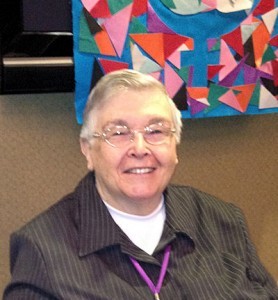
 Virginia Ramey Mollenkott has had a profound influence on my pastoral vocation that includes writing feminist theology and worship resources. Virginia’s book The Divine Feminine: The Biblical Imagery of God as Female, first published in 1984, opened my mind and imagination to female divine imagery in the Bible and to the importance of this imagery to an ethic of equality and justice in human relationships. I have referred often to this book in my writing on expanding images of the Divine. In my worship resources I have drawn from the biblical female names for Deity that she explores in the book, such as Dame Wisdom, nursing Mother, Midwife, Shekhinah, Bakerwoman, Mother Eagle, and Mother Hen.
Virginia Ramey Mollenkott has had a profound influence on my pastoral vocation that includes writing feminist theology and worship resources. Virginia’s book The Divine Feminine: The Biblical Imagery of God as Female, first published in 1984, opened my mind and imagination to female divine imagery in the Bible and to the importance of this imagery to an ethic of equality and justice in human relationships. I have referred often to this book in my writing on expanding images of the Divine. In my worship resources I have drawn from the biblical female names for Deity that she explores in the book, such as Dame Wisdom, nursing Mother, Midwife, Shekhinah, Bakerwoman, Mother Eagle, and Mother Hen.
The Divine Feminine provides concise, accessible, convincing biblical support for including female names and imagery for the Divine in worship. Mollenkott makes clear that this female divine language and imagery are vital to social justice and peace: “Whereas many religious leaders lament their inability to do more to alleviate world hunger, the nuclear threat, and other economic and racial inequities, their own language is something they could control almost immediately. By recognizing the female presence in their grammatical choices, and by utilizing biblical references to God as female, they could demonstrate the sincerity of their commitment to human justice, peace, and love.”
Virginia has continued to expand my mind and contribute to my justice activism through her other books, including Is the Homosexual My Neighbor?: A Positive Christian Response, co-authored with Letha Dawson Scanzoni; Omnigender: A Trans-Religious Approach; and Transgender Journeys, co-authored with Vanessa Sheridan. Virginia’s prophetic work is also included in my book She Lives! Sophia Wisdom Works in the World and elsewhere on my blog. 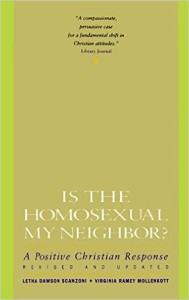
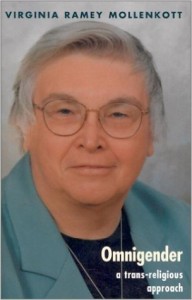
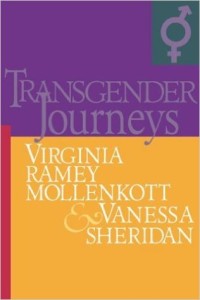
I first met Virginia when I went to hear her preach at Cathedral of Hope in Dallas. After the service, I stood in the long line to shake her hand. She warmly greeted me, and we talked about our shared experiences as English professors and Christian feminist writers. I thanked her for her major contributions to my writing and other ministries. I’ve delighted in the opportunity to continue connecting with Virginia through Evangelical & Ecumenical Women’s Caucus-Christian Feminism Today.
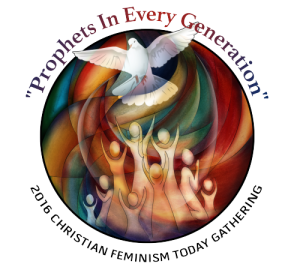 Virginia was not able to go to the Christian Feminism Today Gathering this summer, but she wrote an inspiring letter for the printed program and for publication in Christian Feminism Today. Below is Virginia’s letter to “Younger Christian Feminists.”
Virginia was not able to go to the Christian Feminism Today Gathering this summer, but she wrote an inspiring letter for the printed program and for publication in Christian Feminism Today. Below is Virginia’s letter to “Younger Christian Feminists.”
“Warmest greetings to all of you who were able to attend the 2016 gathering of Christian Feminism Today! And if you are under 84 years of age, be assured that, from my angle of vision, you are the younger generation. And this is my message to you.
My favorite Shakespeare sonnet is number 116, which begins, ‘Let me not to the marriage of true minds / Admit impediments.’ Shakespeare has borrowed the word impediments from the Anglican wedding service, where the officiant asks the witnesses to ‘speak now or forever hold their peace’ if they are aware of any impediments to the marriage. But Shakespeare is not writing exclusively about weddings based on physical attraction. No; his focus is on ‘the marriage of true minds.’
What does it mean to form a lasting connection between and among true minds? I would define it this way: the people involved sense the eternal oneness that is created within them and between them by ‘the Spirit that flows through all things’ (Wordsworth’s phrase). They are able to feel what others are feeling because the Spirit has enlightened their sympathetic imaginations, a universal empathy that does not value anyone more than anyone else but rather honors the sanctity of every thing and every being—female, male, cisgender, transgender, whoever, whatsoever. And in that sense, by the authority vested in me by my 84½ years of living, I hereby pronounce the Evangelical & Ecumenical Women’s Caucus a collective marriage of true minds.
As such, we call ourselves feminists, but not because we think women are superior to men, or that feminine women are better than masculine men, or for that matter better than queer people or people of any other variety. We are feminists because we are universally egalitarian, and because girls and women have been for centuries excluded from ‘equal justice for all.’ In other words, we took the name of the marginalized and exploited gender only in order to expedite the justice that would ensure decent minimum wages, equal pay for equal work, opportunity for religious and political leadership, freedom of reproductive control, and the like.
Rather than cringing from the label feminist, you younger feminists will (I hope) continue to use the term to correct erroneous assumptions about its meaning. Just as ‘Black lives matter’ does not mean that white lives don’t matter—only that, to date, black lives have not been cherished equally along with all other lives—in the same way, feminism does not exalt some people above others but instead pushes toward universal and equal justice. Of course we could call our Christian feminist movement Christian humanism; but that would be like substituting ‘All lives matter’ for ‘Black lives matter.’ It is important to name specifically those who have been marginalized in order to end that trivialization. Female lives matter. Black lives matter. Queer lives matter. Only by insisting on naming unjust exclusions can we hope to do away with these exclusions.
For this reason it is vital that you younger feminists continue to challenge Christian congregations to speak of God as our Mother, Sister, Friend, Beloved, She Who Is, both male and female and neither male nor female. Frequently! Such insistence does not imply that ‘If God is female, then females are God,’ as our sister Mary Daly rightly declared about men and exclusively androcentric God-language. No; we lift up female, trans, and neuter God-language in order to raise the formerly excluded images to a healthful and balanced inclusion in our imaginations. In this way we honor girls and women and transpeople and the natural environment on an equal basis with the androcentric bias that has supported male supremacy for centuries. Our only ‘bias’ should honor universal equality!
Make no mistake: if Christian pastors and priests refuse to use inclusive God-language, they do not sincerely care about justice for every body and every thing. Language is free, whereas fair practices entail a great outlay of energy and money, and for some, a significant yielding of previous power. So if Christian leaders will not make use of inclusive God-language to the degree that it becomes ‘usual’ and ‘everyday,’ they are denying the importance of the Bible’s gendered symbolism. Either from sheer ignorance or stubborn bigotry, they are actively denying equality and blocking universal justice. We cannot give up until the Divine Presence is honored as truly omnipresent.
Shakespeare’s sonnet 116 asserts that ‘Love is not love which alters when it alteration finds / Or bends with the remover to remove.’ So when you younger feminists encounter disagreements within your ranks, I hope you will continue cherishing your connectedness until you can reach a fair and workable consensus. Like the stars that provide guidance for ships at sea, our Christian feminist commitment can keep our ‘marriage of true minds’ steady and ‘on course.’
I love you and wish I could be with you. But part of old age is learning to ‘let go’ gracefully. And I am hugely thankful for the younger leaders who have sprung up to take the place of the leaders from my generation. At one time, years ago, feminists shied away from leadership, as if it always implied inequality. But it implies no such thing as long as opportunity remains open to all who are willing to do the work that leadership requires. I thank God for each of you who have demonstrated that willingness!”
Virginia’s Letter, “True Minds,” originally published in Christian Feminism Today. Reposted with permission.